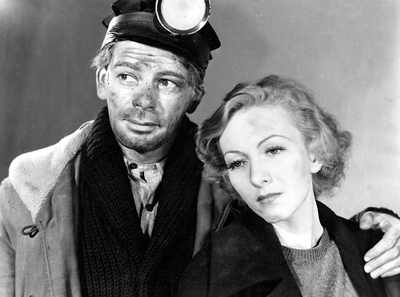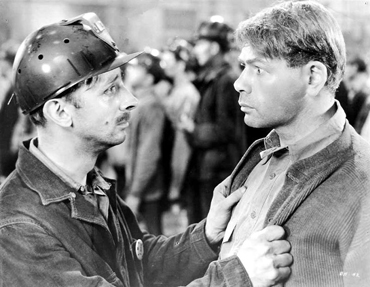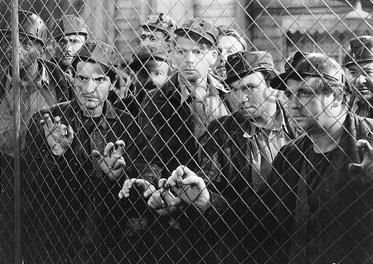
 |
|
|
|
It's not uncommon to hear someone say that Hollywood censorship made movies better by forcing writers to cover touchy subject like sex and politics through suggestion and indirection. That's absolute rubbish. The Production Code didn't bring good taste to the movies, and it encouraged moral hypocrisy and gross distortions in its depictions of American life. Far worse, the Code office went beyond its mandate and imposed political censorship: free speech didn't apply to the movies. Perhaps the best example of the corrupting influence of the Code is 1935's Black Fury, a Warners film sold as an exposé of the conditions in America's coal towns. What was reported in the papers and newsreels as "labor unrest" was really the suppression of labor by industry bosses, who often hired private police to protect their property. The miners sought decent wages, minimal safety rules and a decent standard of living. The coal companies employed organized crime to terrorize and sometimes murder workers, often with the approval of the government. 
Warners had championed the social comment film with dramatic and powerful pictures like 1932's I Am a Fugitive from a Chain Gang, which was honored by progressives but labeled Bolshevik propaganda by the right. With the 1934 enforcement of the Code, studios ran into unexpected problems with the office of the Code administrator, Joseph Breen. Accustomed to slipping their pictures by without too much trouble, the studio bosses suddenly found that they could not predict what the code would reject. What exactly constituted acceptable content became a moving target. Black Fury is a "hard hitting" drama about a happy-go-lucky miner, Joe Radek. He's disappointed when his girl Anna Novak (Karen Morley, an icon of Depression-era Warner dramas) runs away with a good mine cop (William Gargan) to avoid the misery of being a coal miner's wife. Radek becomes a strike leader. When his best friend Mike (John Qualen, then typecast as a proletariat underdog) is killed by strikebreaking thugs, Radek seizes a cache of dynamite and threatens to wipe out the company's most important mine. Warners' "searing exposé" originated with a novel written by a retired judge, and a play; both were about the 1929 murder of coal miner Mike Shermanski by a company policeman. Jack Warner prepared the story for the screen, but when actor Paul Muni went to work in a coalfield to get background for the role, the industry found out about the production. Before coming to Hollywood, Joseph Breen had worked PR for a coal company. His new job was to clean up Hollywood films so that they could be distributed throughout the country without harsh local censor intervention. But what got censored was often political in nature. Breen proceeded to negotiate changes to the script - changes dictated by the coal mining industry. 
As produced, Black Fury resembles a Soviet movie cleared and 'adjusted' by a central committee, whose edicts cannot be questioned. Its whitewashing of the inhuman conditions in many mine communities has few comparisons outside of Nazi propaganda movies. The coal miners are docile first generation immigrants called hunkies. Joe just wants to work hard and someday own a farm. His people are poor but happy; the place looks clean and the children are well fed. The workers grouse against 'dead work': they aren't paid for clearing away rock or laying ore-train rails, just for actually digging coal. The inoffensive Mike Shermanski says out loud that things used to be far worse, and they're getting better all the time. Perennial Warners baddie J. Carroll Naish stirs up strike trouble; it turns out that he's an agitator hired by "The Industrial Detective" agency, which wants trouble so that they can win a contract for mine security. Naish cleverly promotes Joe as the strike leader. Mine owner Hendricks (Henry O. Neill) loves the miners. He regrets that he must hire scabs to keep his business going, and extra cops to protect his property -- which includes all the shacks that the miners must rent from him. Hendricks is shocked when the thugs beat the miners, and kill Mike. It's not his fault. Essentially, the movie says that life as a miner isn't easy but that the owners are not responsible for strikes or violence; it's all the fault of outside agitators. The government steps in at the last minute to guarantee justice for all concerned. In reality, state troops were sometimes called in on the side of industries that needed defending from "Communist" strikers. As for the miners themselves, they're depicted as childlike and impressionable, and too emotional to handle their own affairs. Joe Radek's act of terror comes to an end with Anna's intervention. Dumb and earnest, Joe is almost as infantile a character as Muni's earlier Scarface. 
Even after this outright bowdlerization, Black Fury was rejected in three states. This embarrassed Joe Breen, as the studios followed his edicts just so the states wouldn't cause trouble. It didn't make much difference, as most reviews were negative and audiences stayed away. Warners would continue to have a social conscience -- they were the first studio to defy the pro-German element in Washington and make a big anti-Nazi picture. But with just a few exceptions (Black Legion, They Won't Forget), the socially conscious Warners picture was killed by the Code: movies that questioned the political status quo were not encouraged. Karen Morley's acting career was all but terminated when she became an activist in the Hollywood strikes of the late 1930s. Black Fury is directed by Michael Curtiz with his customary panache, but Muni's performance is a bit over-the-top and the dramatics are altogether too obvious. These things probably wouldn't have been that much different had the show given an honest portrayal of the coal industry situation, which still periodically suffers from egregious, criminally culpable abuses by mine owners. Among the supporting players are Barton MacLane as the principal thug, Vince Barnett as another miner and Mae Marsh and Sara Haden as put-upon coal miners' wives. Ward Bond is here as well, playing one of the "nice" mine cops. Sticking out in a small role is none other than the great actor Akim Tamiroff. 
The Warner Archive Collection DVD-R of Black Fury is a good-looking Remastered Edition of this problematic movie, a show that probably serves best as a focus point for teaching Hollywood history. A couple of continuity issues in the second half make it look as if the film were being altered right up until its release -- or, that Warners tried more cuts after its unsuccessful opening. Cameraman Byron Haskin makes the coal mine sets look very real. He alternated between feature camerawork and special effects cinematography, and directed some powerful pictures in the 1950s. A typically bombastic original Warners trailer is included.
On a scale of Excellent, Good, Fair, and Poor,
Black Fury rates:
Reviews on the Savant main site have additional credits information and are often updated and annotated with reader input and graphics. Also, don't forget the 2011 Savant Wish List. T'was Ever Thus.
Review Staff | About DVD Talk | Newsletter Subscribe | Join DVD Talk Forum |
| ||||||||||||||||||